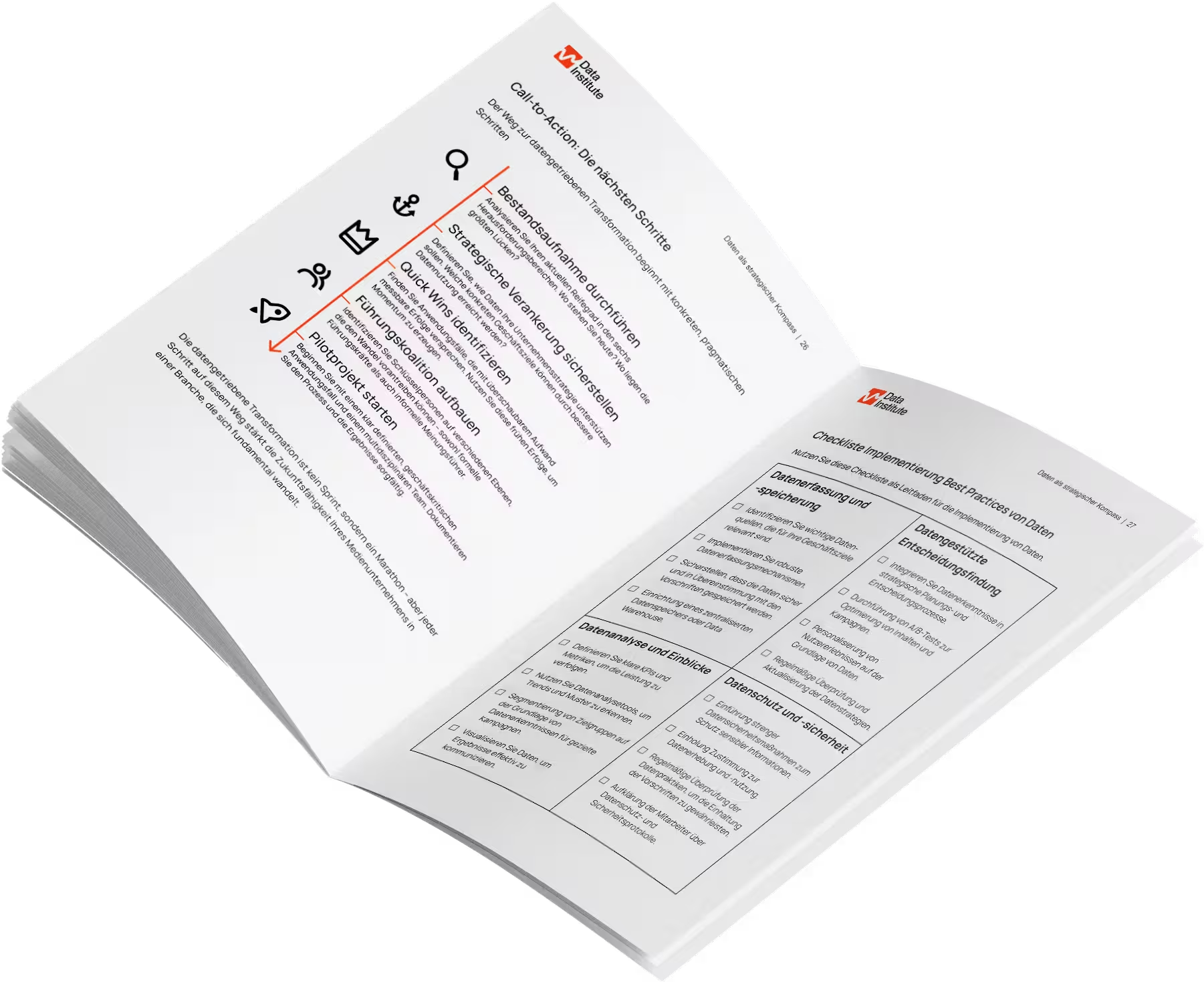Data Governance in SMEs


The roadmap for data-driven transformation
The ePaper shows you strategies, success stories and a checklist for a direct start into the digital future.

- Das ist eine H2
- Das ist eine H3
In today's data-driven business world, a well-thought-out data strategy for medium-sized companies No longer optional, but essential for sustainable success. While many companies have already recognized the value of their data, effective use often fails due to a lack of structured framework conditions. Right here comes Data Governance into play — as a critical component of any successful data strategy.
Data governance is the foundation on which trustworthy and high-quality data can be created. Without this foundation, even the most advanced data analytics initiatives are ineffective or produce erroneous results. For SMEs, which often work with limited resources, a tailored governance approach is particularly important.
Data Governance in SMEs: An introduction
Data governance is a comprehensive framework of policies, processes, and clearly defined responsibilities that controls the entire life cycle of data in a company. It is an ongoing corporate task that ensures that data is treated as a valuable resource. In essence, data governance ensures that data is consistent, of high quality, secure and compliant with the law, and is available to authorized users.
For a detailed definition of all aspects of data governance, the comprehensive benefits, core elements, and implementation steps, we recommend our detailed guide: Go to the comprehensive data governance guide
Why is data governance important for SMEs?
Medium-sized companies face particular challenges when it comes to data management. Unlike large corporations, they rarely have dedicated data departments with extensive resources. At the same time, however, they must deal with the same regulatory requirements and market expectations. A structured data governance approach helps SMEs to overcome these challenges and utilize the full potential of their data.
The specific benefits of effective data governance for SMEs include:
- Improved data quality: Clean, consistent data leads to more reliable analyses and better business decisions.
- Increased efficiency: Clear processes reduce duplication and error rates.
- Increased data security: Sensitive information is better protected, which minimizes the risk of data breaches.
- Compliance security: Compliance with legal regulations is systematically ensured.
- Improved data understanding: Employees develop a better understanding of the value and correct use of data.
- Cost reduction: In the long term, the costs of data cleansing and correction will fall.
- Competitive advantage: Well-founded data-based decisions strengthen the market position.
Specific challenges and solutions for SMEs
The general statement on “Important Aspects of Data Governance” (data quality, data origin, access rights, data protection) becomes a subsection of this new chapter, which discusses the challenges and solutions especially for medium-sized companies highlights.
Instead of repeating the definitions, we focus on the centre-specific aspects and challenges:
Data quality challenge:
- Issue: SMEs often lack a central authority for data quality; data is maintained in isolated solutions.
- Approach: For SMEs, it is recommended to set clear quality indicators and regular quality controls. These should pragmatically be integrated into daily work processes to achieve continuous improvements. Start with the most business-critical data
The challenge of data origin (data lineage):
- Issue: A lack of transparency about the life cycle of data leads to uncertainties and errors.
- Approach: Medium-sized companies should at least for their critical data sets establish clear documentation of the origin of the data. This can first be done with simple means such as structured metadata or even flow charts before using specialized tools. Traceability creates trust.
The challenge of access rights:
- Issue: In smaller structures, access rights are often granted ad-hoc, which entails security risks.
- Approach: A well-thought-out authorization concept ensures that only authorized persons have access to sensitive information. Implement role-based access models And that Need-to-know principle. Regular reviews and documented approval processes are also crucial for SMEs.
Data protection challenge (GDPR):
- Issue: Compliance with complex requirements such as the GDPR often overwhelms internal resources.
- Approach: A systematic approach is essential. Conduct systematically Records of processing activities and implement standardized processes for data protection requests. Training for employees and complete documentation of your compliance measures are practical implementation tips for SMEs.
Pragmatic tips for implementing data governance in SMEs
The successful introduction of data governance in SMEs requires a pragmatic approach. Here are specific recommendations to get you started:
1. Start small, scale gradually: Start with a manageable pilot project in an area with clear benefits, such as improving critical customer data. Gain experience and gradually expand the governance approach to additional areas of data. This reduces risk and enables faster results.
2. Involve stakeholders: Data governance affects the entire company. Therefore, involve representatives from all relevant departments right from the start — from management to specialist departments to IT. Data governance can only be successful if all parties involved understand and actively participate in shaping the benefits.
3. Define roles and responsibilities: Clearly define who has which tasks and decision-making powers within the framework of data governance. Typical roles include: data owners, data stewards, data custodians, data users.
4. Establish clear processes: Define standardized procedures for key governance tasks such as data collection and change, quality assurance, release of data for new uses, handling data issues, regular reviews, and audits.
5. Use appropriate tools: Choose the right tools for your specific governance needs. Simple solutions such as structured documentation in wikis or collaboration platforms may be sufficient to get started. With increasing maturity, it pays off to use specialized software for metadata management, data quality or master data management.
6. Establish a data governance committee: A central governance body coordinates company-wide activities and makes strategic decisions. In SMEs, this body can be kept lean, but should be equipped with sufficient decision-making authority.
Common challenges and our solutions in SMEs
Implementing data governance is complex and poses specific challenges. For medium-sized companies in particular, these hurdles often come to the fore:
Lack of resources:
- challenge: Midsize companies often have limited human and financial resources for data governance initiatives.
- solutions: We help you prioritize the most important data areas and use scalable cloud solutions. We also advise you on how to distribute governance tasks to existing employees and identify automation potential.
Lack of know-how:
- challenge: Many medium-sized companies do not have enough specific expertise in data governance.
- solutions: We offer targeted training and temporary external expertise to ensure knowledge transfer. We also help you to align yourself with established governance frameworks such as DAMA-DMBOK.
Resistance to change:
- challenge: New governance rules can be met with resistance from employees.
- solutions: We rely on benefit-oriented communication, early involvement of employees and the demonstration of “quick wins” to create acceptance. Active management support and an iterative introduction are crucial here.
The Data Institute as your partner for data governance in SMEs
Implementing effective data governance requires not only conceptual knowledge, but also practical experience in implementation. The Data Institute supports medium-sized companies with a holistic approach to this challenge.
Our proven Framework: Organization, Culture, and Architecture views data governance as part of a comprehensive ecosystem based on these three pillars to ensure a successful data strategy.
Find out in detail how our data governance consulting can help you: About our data governance consulting service
EU data strategy: Relevance of data governance legislation (DGA) for SMEs
The Data Governance Act (DGA) is an important pillar of the European data strategy and aims to strengthen trust in data exchange and increase data availability in the EU. For medium-sized companies, this means that the Compliance and implementation of DGA principles is becoming increasingly important for international data exchange and the use of data exchange services. It is crucial to understand that the DGA supplements the provisions of the GDPR. You can find all details about the data governance act in our comprehensive Data Governance Guide. Go to the comprehensive data governance guide
Conclusion: Your path to a data-driven future in SMEs
Data governance is not a luxury for medium-sized companies, but a strategic necessity. At a time when data is increasingly decisive for competitiveness, a structured governance approach forms the basis for responsible, efficient and value-creating use of this resource.
Implementing data governance is not a one-time action, but a continuous journey. It requires initial investments in processes, competencies and, where appropriate, technologies, but pays off in the long term through better decisions, greater efficiency and reduced risks.
As an experienced partner, the Data Institute is at your side on this journey. We combine in-depth expertise with practical implementation experience and a holistic understanding of the challenges faced by medium-sized companies. Together, we create the foundations for a successful data-driven future for your company.
The right time to start data governance is now. Contact us for a non-binding initial consultation and find out how we can support your company on the way to structured and value-adding data usage. Arrange a free initial consultation

Case studies, events and data news?
Just subscribe to our newsletter and stay up to date.
Case studies, events and data news?
Just subscribe to our newsletter and stay up to date.

Case studies, events and data news?
Just subscribe to our newsletter and stay up to date.

Related case studies
There are suitable case studies on this topic
Which services fit this topic?

Stay up to date
Simply subscribe to our newsletter.
Stay up to date
Simply subscribe to our newsletter.

Stay up to date
Simply subscribe to our newsletter.




